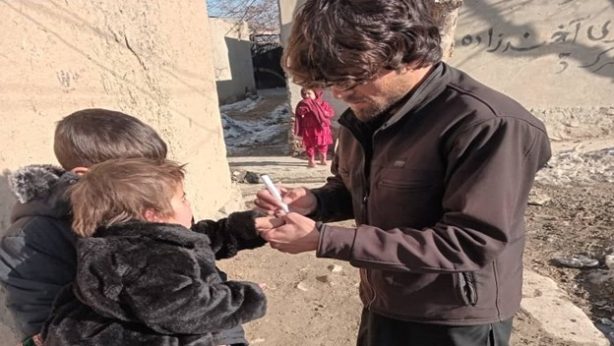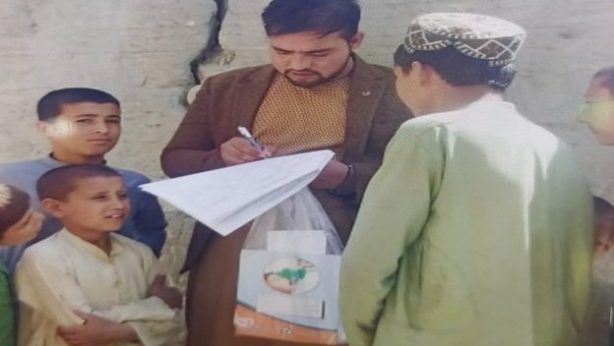Two Drops of the Polio Vaccine: A Volunteer’s Efforts to Protect Children

Nangarhar, Afghanistan – The Daman area in the Bihsud district of Nangarhar province, home to many displaced and returning refugees, is one of the most vulnerable regions due to the spread of polio.
In this region, a 35-year-old volunteer named Zahidullah has been fighting on the front lines against polio for the past seven years.
He is a member of the fifth team in cluster 59, playing a key role alongside his colleagues in ensuring the success of polio vaccination campaigns.
A Pivotal Moment of Resolve
Zahidullah recalls that beginning his efforts as a volunteer to protect children from polio was not a coincidence but a conscious choice inspired by a heart-wrenching scene.
He explains, “Years ago, one day in my village, I saw a young boy whose legs had been paralyzed by polio. He struggled immensely to move his wheelchair, his eyes were filled with longing to play with his peers, but he was unable to do anything. This scene pained me deeply, and in that moment, I vowed to fight this disease so that no other child would endure such a fate.”
Since that day, Zahidullah has been on the front lines of polio vaccination campaigns.
Together with his team, he works diligently and responsibly across various areas of Bihsud District, and firmly believes that the efforts of himself and his fellow volunteers are the best investment in protecting children and securing a brighter future.
 Volunteers like Zahidullah are not merely fighting polio; they are also setting an inspiring example for sustainable community development © Polio Free Afghanistan / 2025 / Fazal Mohammad Hosaini
Volunteers like Zahidullah are not merely fighting polio; they are also setting an inspiring example for sustainable community development © Polio Free Afghanistan / 2025 / Fazal Mohammad Hosaini
The Power of Public Awareness
Zahidullah considers building public trust and increasing awareness about the polio vaccine key to success.
He states: “Compared to the past, public awareness has significantly improved. People now understand the dangers of polio and the benefits of vaccination, thanks to intensified awareness activities by health workers and volunteers, as well as critical information shared through social media.”
According to him, local residents now widely cooperate with polio vaccination campaigns, ensuring that all children under the age of five receive the vaccine.
However, he noted that despite all these efforts, the Daman area of Bihsud district requires significant attention due to the potential risk of poliovirus transmission and spread.
Zahidullah explains that many of the families in this region are displaced or returning refugees, which poses the risk of heightened poliovirus transmission
He also mentioned that among these families, there were some who refused to vaccinate their children against polio.
For instance, he cited the family of Mohammad Hasan, who, due to misinformation, declined the vaccine for their children. However, Zahidullah and his team provided them with comprehensive information about the polio vaccine, and now they enthusiastically vaccinate their children.
Mohammad Hassan himself says: “In the past, I refused to vaccinate my children due to misinformation because I thought the vaccine was harmful. But when the vaccination team, led by Zahidullah, came and explained everything in detail, I realized that polio is a dangerous disease and vaccination is the only way to prevent it.”
He adds that now he confidently vaccinates his children and advises other families to vaccinate their children and protect them from this disease.
Conclusion
Volunteers like Zahidullah are not merely fighting polio; they are also setting an inspiring example for sustainable community development
Thanks to the tireless efforts of him and his team, the residents of the Bihsud district are now not only more aware of the risks posed by polio but are also actively supporting vaccination campaigns to protect their children.
In the end, the exchange of information and social efforts can bring serious and effective change in the fight against polio.
Every family and individual must become part of this fight, for it is only by working together that we can take lasting and effective steps to safeguard all children from the disease.
Fazal Mohammad Hosaini, Polio Free Afghanistan


